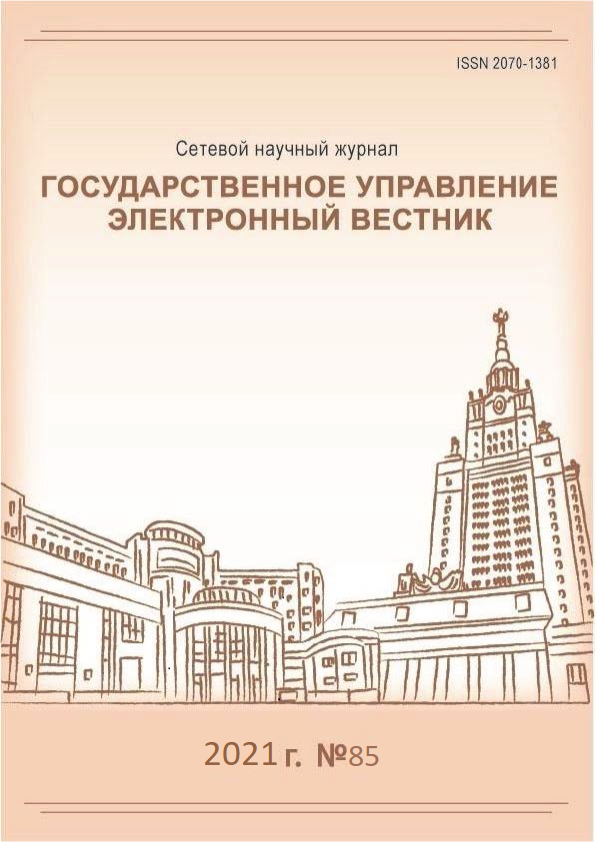Export of Educational Services in the Global Education Market
Keywords:
International education market, education export, education internationalization, educational services, educational product, importers and exporters of educational services, competition in the education marketAbstract
The article presents an analysis of the state of the international higher education export market and the practice of gaining a competitive advantage by market leading universities. Higher education is viewed as a high-tech, intellectually intensive branch of the country’s economy, as a way of producing intellectual capital. The global trends and export strategy of higher education are determined. It is shown that the export of educational services, which ensures the high quality of higher education and scientific research, forms the high professionalism of the teaching staff and is the driving mechanism for the internationalization of the education system. In addition, it is used as an instrument of “soft power”, of state influence and serves as a significant source of income for an educational organization and the region. The modern education market is represented by countries such as the United States, Great Britain, Germany, Australia, China and Russia, which use various tools to conquer the higher education market. The competitiveness of Germany is ensured by a relatively low payment for educational services and high ratings of scientific and technical developments, which is an effective factor in attracting foreign students; Australia effectively uses migration policy, and China receives preferences due to its territorial position, attracting students from Asian countries due to the absence of a language barrier. It isshown that government policy significantly affects the country’s presence in the education markets. In the UK, the number of students from the European Union has decreased due to the government’s Brexit policy, US government policy has led to a decrease in the number of Chinese students, which constituted the most massive segment of the education market. The analysis of the presence in the international education market of Russia is carried out, on the basis of which recommendations are proposed for promoting domestic education through the use of the developed models/technologies for the export of educational services.
References
Арефьев А.Л. Российские вузы на международном рынке образовательных услуг. М.: Центр социального прогнозирования, 2007.
Васильева Е.И. Факторы развития экспорта образования в условиях глобализации // Молодежь в меняющемся мире: векторы развития в глобальной современности. Материалы X всероссийской научно-практической конференции. Екатеринбург: Уральский государственный педагогический университет. 2019. С. 51–59.
Государственное управление. Электронный вестник Выпуск № 85. Апрель 2021 г.
Гурулева Т.Л., Бедарева Н.И. Сотрудничество России и Китая в области создания сетевых университетов и совместных образовательных учреждений // Высшее образование в России. 2019. № 4. С. 108–123. DOI: 10.31992/0869-3617-2019-28-4-108-123.
Должикова А.В., Тисленко М.И. Стратегии экспорта высшего образования в России и Мире // Высшее образование сегодня. 2018. № 5. С. 64–72. DOI: 10.25586/RNU.HET.18.05.P.64.
Косевич А.В. Экспорт высшего образования как потенциальный фактор развития мировой экономики // Инновации и инвестиции. 2017. № 6. С. 83–86.
Кудина М.В., Логунова Л.Б., Петрунин Ю.Ю. Национальное образование в эпоху глобальной цифровой революции // Вестник Московского университета. Серия 21. Управление (государство и общество). 2019. № 4. С. 3–22.
Лачинский С.С., Морачевская К.А, Зиновьев А.С., Сорокин И.С. Международные университетские объединения в социокультурном взаимодействии стран мира // Геополитика и экогеодинамика регионов. 2018. Т. 4(14). № 4. С. 220–227.
Митин Д.Н. Образовательная (учебная) миграция: понятие, проблемы и пути решения // Вестник РУДН. Серия. Политология. 2010. № 3. С. 123–134.
Устюжанина Е.В., Евсюков С.Г. Цифровизация образовательной среды: возможности и угрозы // Вестник РЭУ им. Г.В. Плеханова. 2018. № 1(97). С. 3–12. DOI: http://dx.doi.org/10.21686/2413-2829-2018-1-3-12
Фурман Б.А., Балахнин М.М. Опыт организации экспорта образовательных услуг в странах — новых «игроках» мирового рынка (на примере Катара и Новой Зеландии) // Вестник Московского городского педагогического университета. Серия: Педагогика и психология. 2015. № 1(31). С. 96–106.
Цинфэн Ли, Вэйхэ Се. Современная ситуация регионального развития образования в КНР и коррекция курса // Россия — Китай: образовательные реформы на рубеже XX–XXI вв. сравнительный анализ. М.: [б. и.], 2007.
Шваб К. Четвертая промышленная революция. М.: Эксмо, 2016.
Щукина Т.В. Интернационализация высшего образования: предпосылки необходимости экспорта, нормативно-правовое регулирование и политико-экономические проблемы // Право и практика. 2019. № 4. С. 75–82.
Downloads
Published
Issue
Section
Categories
Similar Articles
- Anna М. Ryabinina, Trends in Academic Mobility in the Context of the COVID-19 Pandemic on the Example of Lomonosov Moscow State University , Public Administration. E-journal (Russia): No. 92 (2022)
- Natalia P. Ivashchenko, Vera G. Popova, Konstantin S. Sadov, On the Issue of Criteria for Innovativeness of Business Models of Pre-University Education , Public Administration. E-journal (Russia): No. 102 (2024)
- Ilia S. Balakshin, Marketplace Trends and Industry Expertise in Russia , Public Administration. E-journal (Russia): No. 109 (2025)
- Anna М. Ryabinina, Technologies of Higher Education Internationalization in Modern Conditions , Public Administration. E-journal (Russia): No. 94 (2022)
- Elmira Sh. Shaimieva, Guzel I. Gumerova, Elvina R. Gareeva, Lean Startup to Increase the Competitiveness of Russian Universities: Scientific and Theoretical Aspects , Public Administration. E-journal (Russia): No. 110 (2025)
- Elmira Sh. Shaimieva, Guzel I. Gumerova, Aleksandra J. Butneva, S. Hüsig, G. Schewe, Intellectual Property as a Driver for International Scientific Cooperation: Development of Indicators for Russian Practice , Public Administration. E-journal (Russia): No. 88 (2021)
- Eugenia V. Andryushina, Prospects for the Formation of Russian-Centric Model of Higher Education , Public Administration. E-journal (Russia): No. 104 (2024)
- Maria I. Bubnova, Alsu H. Tezyel, Specifics of Organizing Educational Process in the Context of Internationalization (Case Study of Chinese Students of the School of Public Administration, Lomonosov Moscow State University) , Public Administration. E-journal (Russia): No. 106 (2024)
- Guzel I. Gumerova, S. Hüsig, G. Schewe , Aleksandra J. Butneva, Elmira Sh. Shaimieva, Formation of Organizational and Managerial Approach Based on Management of Intellectual Property Objects in the Field of International Scientific Cooperation , Public Administration. E-journal (Russia): No. 91 (2022)
- Svetlana S. Popova, Svetlana A. Boiko, Ekaterina V. Gokhshtand, Artem A. Nedrov, Andrej R. Shevchuk, Digitalization of Public Employment Service , Public Administration. E-journal (Russia): No. 86 (2021)
You may also start an advanced similarity search for this article.




